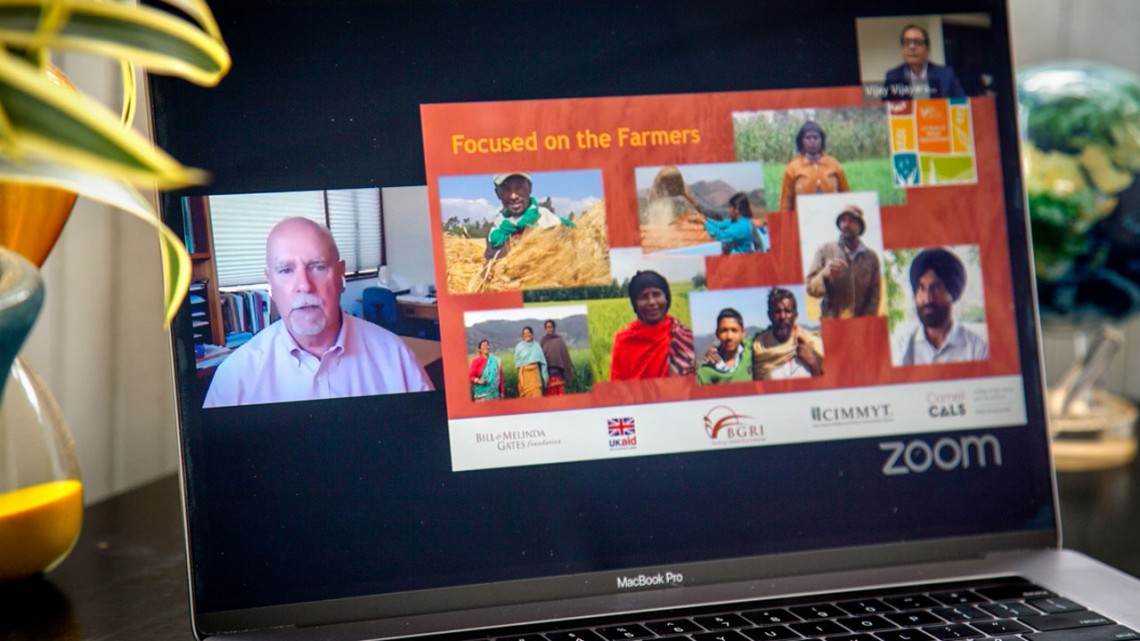
Ronnie Coffman, the Andrew H. and James S. Tisch Distinguished University Professor, speaks to a global audience June 25 at the “Take It to the Farmer” event from the Borlaug Global Rust Initiative.
Coffman highlights Cornell efforts to protect wheat worldwide
By Matt Hayes
Scientists in the College of Agriculture and Life Sciences have been on the front lines of the battle against global wheat pathogens for 15 years, ever since they helped found the Borlaug Global Rust Initiative (BGRI) in response to a novel wheat pathogen that emerged in East Africa in 1998.
Ronnie Coffman, Ph.D. ’71, the Andrew H. and James S. Tisch Distinguished University Professor, director of International Programs and international professor in the Department of Global Development, described those early efforts and long-running scientific work to combat wheat disease in a keynote speech June 25 from BGRI.
The virtual “Take It to the Farmer” event featured videos and discussion with farmers and experts from around the wheat-growing world.
Coffman, vice chair of BGRI, said the wheat pathogen first characterized in Uganda in 1999 – giving it its name, Ug99 – was deadly to nearly all wheat varieties and threatened to cause epidemic losses in wheat fields around the globe.
The world averted disaster thanks to the coordinated global effort led by BGRI, which is based at Cornell, with more than $100 million in funding for the Durable Rust Resistance in Wheat (DRRW) and Delivering Genetic Gain in Wheat (DGGW) projects from the Bill & Melinda Gates Foundation and UK aid from the British people, he said.
BGRI and the projects it managed was essential to protecting one of the world’s most important crops, according to Coffman, who worked with Nobel Peace Prize winner Norman Borlaug, a plant breeder who helped lead the Green Revolution, in the wheat fields in Mexico in 1970 as a Cornell doctoral student in plant breeding.
Coffman noted crucial outcomes from the DRRW and DGGW projects, including: vast increases in land planted with rust-resistant varieties; global expansion of a wheat pathogen surveillance network; more young wheat scientists across the globe – especially women – trained to be wheat breeders, pathologists, gender experts and project leaders; and the establishment of a global wheat community dedicated to the improvement of one of the world’s most important crops.
“BGRI has focused on delivering rust-resistant varieties of wheat to the farmers around the world who depend on agriculture and wheat production for their livelihoods,” he said. “We have been especially dedicated to small-holder farmers in wheat-producing countries in Africa and Asia – men and women who do not always have the access to new technologies, like improved seed, that they need.”
Over the past 12 years, working with national programs in 11 at-risk countries, BGRI scientists have released more than 270 new varieties of wheat with greater resistance to diseases and environmental stresses such as climate change.
“These varieties have contributed enormously to improving the livelihoods of the farmers who adopted them,” Coffman said.
Maricelis Acevedo, associate director for science for DGGW and senior research associate in the Department of Global Development, said the successes were only possible by building a network of global researchers working in tandem with farmers on a common goal: to secure the world’s wheat.
“Science and agriculture are forever linked in our enduring quest to feed the world,” Acevedo said. “The BGRI is committed to making sure scientific innovations help the world’s farmers prosper.”
According to Coffman, long-term sustainability and durability depend on knowledgeable and dedicated scientists. Since 2008, more than 1,000 wheat scientists from countries around the world have been trained with funding from the projects, he said.
“As we move forward, to 2030 and beyond,” he said, “we must rededicate ourselves to understanding farmers’ needs, because they are the ultimate beneficiaries of our work.”
A version of this story appears on the Department of Global Development website.
Matt Hayes is associate director for communications for Global Development in the College of Agriculture and Life Sciences.
Media Contact
Get Cornell news delivered right to your inbox.
Subscribe
